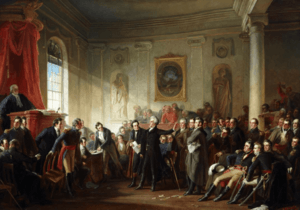Arrest of Dominic Hall and Louis Louaillier facts for kids
Dominic A. Hall and Louis Louaillier were important figures in American history. They were involved in a disagreement with Major General Andrew Jackson during the War of 1812. This happened in 1815. Jackson ordered their arrest. Later, Judge Hall investigated Jackson's actions. This led to Jackson paying a fine.
Contents
Protecting New Orleans
What Was Martial Law?
In December 1814, Major General Andrew Jackson arrived in New Orleans. The city was in danger from British forces. To keep the city safe, Jackson made a big decision. He declared "martial law." This meant the military took control of the city. It was the first time this had ever happened in the United States.
Why Was Martial Law Declared?
Jackson believed martial law was needed. It helped him organize the city's defense quickly. This allowed him to prepare for the British attack. He wanted to make sure New Orleans was ready to fight.
The Louisiana Courier Article
A Senator's Concerns
On March 3, 1815, a state senator named Louis Louaillier wrote an article. It appeared in a newspaper called the Louisiana Courier. Louaillier did not sign his name at first. He wrote about his worries regarding Andrew Jackson's actions.
Criticizing Jackson's Orders
Louaillier's article questioned why martial law was still in place. The British had already left the battlefield. He also felt that the local militia should be allowed to go home. Two days later, Louaillier admitted he wrote the article. Jackson then ordered Louaillier's arrest.
Judge Hall Steps In
Dominic A. Hall was a U.S. District Court Judge. He heard about Louaillier's arrest. Judge Hall then signed a special order. This order was called a "writ of habeas corpus." This legal paper asks for a person to be brought before a judge. It checks if their arrest is lawful.
Jackson Orders More Arrests
Jackson did not like Judge Hall's order. He believed it interfered with his military control. So, Jackson then ordered Judge Hall's arrest too.
Arrests and Release
A Judge in the Militia
Jackson continued to stop people from speaking out. He ordered the arrests of Louaillier, Hall, and a lawyer named John Dick. Another judge, Joshua Lewis, stepped in. Judge Lewis was also serving in Jackson's militia. He signed his own habeas corpus order. This order asked for Judge Hall to be released.
Louaillier's Court-Martial
Jackson went ahead with a military trial for Louaillier. This is called a court-martial. Louaillier was found innocent. However, Jackson still kept him in jail.
Hall's Release
Jackson eventually released Judge Hall. He even escorted Hall outside the city limits. This was beyond the area where martial law was active. Jackson told Hall not to come back. He said Hall should wait until the war was officially over.
The War Ends
Just two days later, Jackson received important news. The Treaty of Ghent had been signed. This meant the War of 1812 was officially over. Jackson immediately ended martial law. He also released all the prisoners.
Andrew Jackson's Trial and Fine
Jackson Faces the Court
After the war ended, Judge Hall took action. He ordered an investigation into Jackson's decisions. Jackson was called to court. Judge Hall was the one overseeing this trial.
The Fine
The court found Jackson in "contempt of court." This means he had disobeyed the court's authority. Jackson was fined $1,000. He paid this amount in full.
A Later Repayment
Many years later, in 1844, Congress decided to act. They voted to pay Jackson back the $1,000. They also added interest. This brought the total amount to about $2,700.


